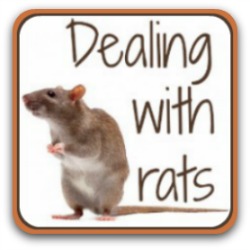Rat problem in your chicken coop?
Don't fall for the sometimes costly myths about how to get rid of them.
So you have a mouse or rat problem in your chicken coop? You never want to think it will happen to you. And then, one day, it does.
And you're desperately looking for an answer.
What to do?
There are lots of "solutions" out there about how to get rid of rats and mice from your home and your chicken coop.
Some are based on anecdotal personal experience: "it worked for my grandma so it must work for everyone".
Few are based on fact.
Many can simply be an expensive way to waste your money.
In this article, I look at the five most common myths about what will "definitely" get rid of vermin, and explain why they are highly unlikely to have any effect at all.
My information is, unlike these customs, based on researched fact.
My aim? To save you money, and the stress of trying different methods without success.
And to provide you with a free checklist of what actually does work. Tips to help you know what you need to do to keep your chickens and their home happily free of a rat problem in the future.
To receive that checklist, you'll need to sign up to my Chicken Digest newsletter.
This is a long, detailed article. Follow these links if you're interested in a specific section.
Myth #1: Ultrasonic repellents will get rid of rats in your chicken coop.
There are many of these repellers on the market, and they're generally pretty expensive. Think I'm exaggerating? Check out this one... (but don't buy it!).
You'll see manufacturers making all kinds of claims for them.
The most
common is that they will get rid of more or less anything that moves:
rats, mice and cockroaches for example, by transmitting an ultrasonic signal which humans can't hear but rats and mice do hear and can't tolerate.

Some people swear by these. But not for getting rid of a rat infestation.
Cockroaches and crickets seem to be the bugs most affected by ultrasonic devices, although some research studies dispute even those claims(1, 2).
Here's the fact about their effect on rodents: they sing along with them.
Trust me – I've tried them all. They simply don't work.
But don't take my word for it. That would be just another anecdotal story, which I like to avoid.
The Federal Trade Commission of America(1) has repeatedly warned manufacturers not to make these claims.
Why? For the simple reason that there is no evidence whatsoever, anywhere, that they work for getting rid of a rat problem.
So save your money.
Instead of an expensive ultrasonic device, do this.
- Control the food and you will control the rats.
- If rodents have no access to food, they can't breed. They will simply move on to find somewhere more amenable. No need for repellents.
- So keep your grain away from rats' grasp. Invest in something that will make sure of that, like this rat-proof feeder.
Myth #2: Chicken wire keeps rats and mice out of the chicken coop.
Chicken wire is very good for keeping chickens in, or for stopping them destroying your flower beds, for example.
But it won't keep any predators out of your run – and it's certainly no deterrent to rats.

Rodents have learned to be extremely resourceful in order to survive.
They can climb through and up pipework. They can jump up to three feet high. They can leap four feet across. They can swim. They'll eat through virtually anything, including chicken wire. It's too thin to act as a deterrent.
And rats have flexible skulls, so can fit easily through any gap less than half an inch wide(3).
So even if they don't gnaw through the wire – which they will – chicken wire has holes easily large enough for any rat to get through.
You will not get rid of your rat problem like this.
Instead of buying chicken wire, do this.
- For a large run, invest in high quality chain link fence.
- For a smaller flock, consider a rodent-proof coop such as Omlet's Eglu Cube.
- Add a rodent-proof walk-in run like this one to your backyard arrangement.
Myth #3: Dog / cat / ferret urine are a solution to a rat problem.
Here's the theory: rats are deterred by the urine of any animal they know to be a predator.
Humans, dogs, cats and any member of the weasel family are the top predators rats are wary of.
It's not as strange a theory as it might sound, and it has some basis in research(4).
 Ferrets kill chickens!
Ferrets kill chickens!However, the evidence is that the smells:
- need to be very fresh to have any impact
- after a day or two lose the pheromones which may repel the rodents, and become ineffective
- are unpleasant for humans – something like rotting fish
- actually attract some rodents(4).
These same animals are also predators of chickens, so providing fresh urine in and close to the chicken coop and run, as it needs to be, would mean a potential risk to the flock.
Buying urine online is a possibility, but again it's expensive, especially to keep it fresh.
Rats are intelligent beings who have learned to live with their predators for centuries. Food is their main driver. They know their smells, and it doesn't put them off setting up home wherever they have free access to food.
So it may have worked in controlled laboratory conditions, but it's really not an ideal solution in reality.
Instead of urine, do this.
- As with any potential solution, control access to food as the first priority.
- Get a wild or farm cat. Rescue centres often have feral cats who need rehoming – or ask at your local farm for any kittens of their barn cats they may have available.
- Cats have been used as predators of rodents for centuries, and are one of the most effective rat controllers(6).
- They hunt rats at night when they're most active, and they constantly mark their territory with a pheromone called 2-phenylethlyamine, which rats will avoid.
- Make sure that you keep them outside the chicken run, though. A barn cat will not be averse to taking a chicken as a free meal.
Myth #4: Peppermint / essential oils / cayenne pepper / human hair all deter rats.
Here's the theory: rats have a good sense of smell.
That much is true. They can smell out a feeder full of grain at some considerable distance.
The rest of the theory? All rodents hate the smell of peppermint. Or other essential oils, such as lavender, grapefruit or eucalyptus. Or cayenne pepper, or human hair.
 Peppermint - smells delicious, but no good for a rat problem.
Peppermint - smells delicious, but no good for a rat problem.Here's the fact: rats really are not worried by the smell of peppermint – they will actually eat it. They will certainly not leave your chickens alone just because you hang sprigs around your coop.
Nor will they be phased by the smell of other essential oils, or cayenne pepper, or toilet blocks, or deodorant, or any of the other many, many things you will see advertised as "old timers' deterrents which definitely work".
They definitely don't work.
As for human hair, the theory is that rats don't like humans and will stay away from anything that smells of them.
Except, of course, all rodents love to live where humans live. They have learned that where there are humans, there's food.
And they love food.
Instead of trying smells that deter rats, try this.
The smell rats love the most, the smell which will attract them to your chicken coop, is grain.
So we're back at the very first, and most important,
Myth #5: And finally: can mothballs solve your rat problem?
Here's the theory: the smell of mothballs will keep rodents away.
Your grandma swore by them for keeping moths from eating her woolly sweaters (and she always had that tell-tale sickly sweet smell about her).
But Naphthalene, which mothballs are made of, has been found to be a highly toxic chemical which can cause cataracts and bleeding in the eye, and has been linked to serious illness and death(7).
 They may look like peppermints, but mothballs can kill.
They may look like peppermints, but mothballs can kill.For that reason it was replaced by some manufacturers by Dichlorobenzene - which has since been found to be carcinogenic(7). And it's poisonous not only to chickens but to dogs, rabbits and other animals(8).
Despite that, both these chemicals can still be found in products on the market sold as rat and squirrel repellants.
If their toxicity isn't enough to put you off using them as a way to solve a rat problem, perhaps the fact that they have both been found to ineffective with rodents(8) should.
Steer clear of these. They will not control any level of rat problem, and they can make you, your chickens, your pets and your family ill.
They can look like sweets to children – they have that sickly sweet smell too – but they could prove fatal.
So what does work in getting rid of a rat infestation?
All you need to get rid of a rodent problem is to understand that rats have one-track minds.
Rodents are not a problem because you have chickens. A lot of people believe that, but it's simply just not true. Rats and mice are driven by one thing: hunger.
Rats become a problem because they have access to your chickens' food.
This article will give you a clear direction in terms of how to restrict their access to it, and get rid of your problem for good.
Grab my free checklist!
Interested in a downloadable checklist to keep rats at bay?
I have a free checklist of actions to take to control rodents, which subscribers to my weekly Chicken Digest newsletter receive twice each year.
It summarises in one place all the information from several different articles spread over this website.
If you'd like to receive it too, sign up to my Chicken Digest here.
Related articles you'll find useful.
Sources.
There is a lot of inaccurate and misleading information available on the internet about dealing with mouse and rat problems.
In order to bring you facts which are as solid as possible I rely not only on my own experience, but on scientific, peer-reviewed studies.
These are some of the sources on which I have based the information contained in this page.
1. Federal Trade Commission of America: 'Warning to Manufacturers and Retailers of Ultrasonic Pest Control Devices'. May, 2001.
2. Gramicko, N and Tarasenko, K: 'Ultrasonic Pest Repellers : Solution or Scam?' Pub. International Association of Certified Home Inspectors, 2014.
3. Treftz, Kurt: Fun Facts About Rats & Mice. Pub. Cascade Pest Control.
4. Apfelbach, Are single odorous components of a predator sufficient to elicit defensive behaviors in prey species? Pub. Journal of Frontiers in Neuroscience, 2015.
5. Miller, Jake: The Smell of Danger – Rodent olfaction and the chemistry of instinct. Pub. Harvard Medical School, 2011.
6. Christensen, Jen: Are cats the ultimate weapon in public health? Pub. CNN Health, 2016.
7. United States Environmental Protection Agency: 'Naphthalene - Hazard Summary'. 2000.
8. Gervais, J.et al: Naphthalene Technical Fact Sheet. Pub. National Pesticide Information Center, Oregon State University Extension Services, 2010.
















